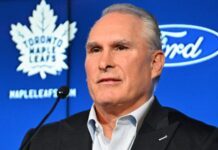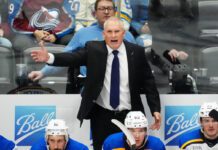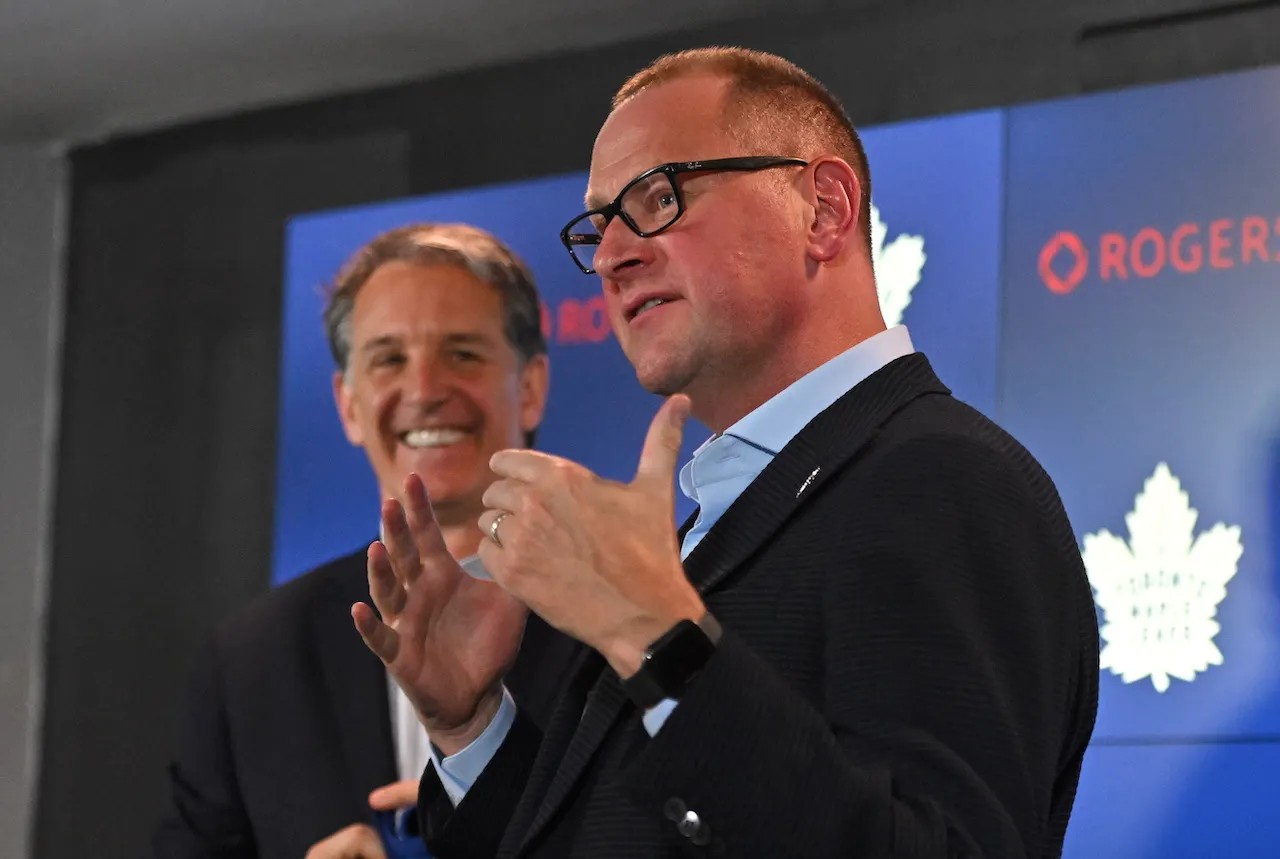After announcing a two-year contract extension for head coach Sheldon Keefe, GM Brad Treliving discussed his decision to stick by Keefe for the upcoming season and why he remains the right coach to take the Maple Leafs over the top in the playoffs.
You could’ve taken a wait-and-see approach with Sheldon and evaluated him throughout the upcoming season. Why was it important to get it done now?
Treliving: A few things.
As I have said earlier, since taking the job, one of the things I have spent a lot of time doing is getting to know Sheldon, spending a lot of time with him, having a lot of discussions about the team, getting his overall thoughts about the group, what has happened in the past, and how we best move forward. You take all of that information and reflect on it.
Number one, first and foremost, it is my belief — having watched it from the outside and having spent a lot of time with Sheldon in the summer here — that Sheldon is a top coach. I think he is a really, really good coach. He has dug in with this group. I think he is smart. I think he is a great communicator. I think he relates well with the players.
I keep coming back to: When you’ve got good people, you want to keep them. It made sense to me.
I know a lot of people may speculate that the reason it is done is the noise and the distractions. As a manager, you are always trying to eliminate distractions, but I want to be clear. That is a byproduct of this. This gets done because I really think we have a good coach here.
His record in the regular season has proved it. What he has done in his young career puts him in some really good company in terms of coaches past and present.
The more I went through this process with Sheldon, it made a whole lot of sense to get something done, get him looked after, get that behind us, give him some peace of mind, and get everything focused where it needs to be, which is on the start of camp with getting everything up and going.
What has impressed you the most about Sheldon since you entered your new role?
Treliving: I think he has a really good relationship with our players. It is not about being liked as a coach. It is about being respected. In the conversations I have with our players, there is a great deal of respect.
He is a student of his craft. He is constantly looking for ways to get better. Throughout the course of the summer, we talk daily. He has really dug into finding ways to make the individuals better.
I think he is a deep thinker. He is cerebral. The time, the effort, and the work he puts towards his craft are impressive.
I don’t know if there is one thing where there is an “aha” moment. It’s like building any relationship. As time goes on, you get a better understanding.
I realize we haven’t played any games and we haven’t been in the battle together yet, but I have spent enough time with him to really understand that he is really knowledgeable. His brain, his work ethic, the way he treats people, the way he works with his staff, and the communication he has with the players is excellent.
When you put all of those things together, to me, it was the right decision.
What gives you the confidence that Sheldon can lead the team deep into a playoff run and potentially a Cup victory?
Treliving: A lot of the same things I just said.
I know we are all focused on the end goal here. There are a lot of steps you have to take before you get there. You have to put yourself in a position year after year to get to the dance and give yourself an opportunity. Sheldon has done that each and every year.
I know it has been talked about in this market for a long time what has happened at the end of the season the last few years, but you have to keep putting yourself in those positions to have those opportunities. To me, to have success in this league, you have to keep knocking on the door. You have to be good for a long time and consistently be a good team. It just gives you another ticket to the ball. You keep knocking on the door, knocking on the door, and knocking on the door until you eventually knock it down.
When I look at all of the attributes that are important for a coach, Sheldon has them. I am just impressed with how he conducts his business. He has a deep, deep passion for this team. I have pushed him to get out of town, turn his phone off for a couple of days, and just get away from it, but he is constantly thinking about how he can push this team and the group of players — collectively and individually — further.
It is through that, the time I have spent, and the questions I have gone through that I feel he is the right guy for the job.
How much did you solicit the input of the players when evaluating Sheldon? What kind of feedback did you get from the players on the job Sheldon has done?
Treliving: I do certainly take feedback from the players, no question. It is a little bit interesting because I am still getting to know the players. It is a little bit of a unique situation.
At the end of the day, you have to be careful sometimes. Obviously, players that have been around a lot longer, have been through some time in the league, and spent some time with Sheldon… It is not a popularity contest, but you can tell when a coach has had an impact on them and when they believe the coach has had an impact on their team. They get pushed.
That was one of the things that came back to me really consistently from the players: It is not that they are going to bat for their buddy, per se, as much as they believe that they have grown as a group. There are uncomfortable times at certain times because he is demanding. He expects a lot. He pushes these guys, but there is a real trust factor.
What I have gathered from the players is that they trust him. They trust that he is doing the right thing by them. It is going to be hard. He is demanding, and I think you have to be demanding as a coach. That is part of this profession. You are trying to strike that balance between demanding and the relationship piece. It is a balancing act.
Not every day is kumbaya in this business. Part of coaching and part of professional sports is conflict. I believe that, and I think it makes you better.
It is a long of saying that the feedback from the players was in strong support of Sheldon and not only the things he has done to make the group better but with how he has pushed each [player] individually.
There was a strong belief and support from the players in Sheldon, for sure.
Speaking of not everything being kumbaya, from your experience, what is your take on a coach calling out players post-game or demanding more publicly in front of the media? How helpful is it? How harmful is it?
Treliving: I think every coach sort of has their own style. At the end of the day, the job of the coach is to maximize the performance of the individual and therefore the performance of the team. There are different ways to do it.
Some days are not all rainbows and lollipops. It is a hard business. It is a hard league. To do great things is difficult. You have to push people out of their comfort zone.
I think there are always ways that you can push players. I think you want to be careful. I have always felt that the hardest conversations are usually best handled behind closed doors. I don’t think a player needs to be admonished publicly to understand if there is something the coach feels he needs to be better at.
Having said that, it is an emotional game. Things happen. I am sure there are going to be emotional times this year, the next year, and the year after. There always is. When you live and work in this business, and you are invested the way everybody is invested, sometimes there is an emotional shrapnel that comes up.
I haven’t been through it in Toronto. I am sure it flies right under the radar in Toronto and nothing ever gets printed or there are no headlines for it, for sure, but what I have found out — nine times out of 10 — is that it is just a little bit of noise and emotion. You don’t want that every day, but to think you are not going to have that every once in a while, we are probably kidding ourselves.
I think you handle your business as men behind closed doors face-to-face. I am sure that is how a lot of it will be handled here moving forward.
Can you give us a specific example of when Sheldon’s leadership has impressed you?
Treliving: There is a lot of stuff.
When I look at coming in here, accountability would be a good word. When I first came in, Sheldon was really transparent, honest, and accountable for what has gone on here.
As we look to get better, I always think that you first start with yourself and critiquing your own performance. I think Sheldon has done that.
I look at what he has done over the course of the summer in terms of connecting with our players, getting their feedback on certain things, and also looking at ways we can change. Given the success the team is having in the regular season, it would be safe to say, “We are going to stay status quo,” but he is exploring and pushing the envelope on ways we can be better.
Through conversations when we were going through free agency, I would talk to the players and their representatives, but I had Sheldon talk to all the players before committing to anybody. The feedback he would get from those players was how impressive he was.
I look at the staff he has put together. We sat down and talked about wanting to put together the very, very best staff we could. He went out and found what he felt were the best people in those jobs.
I look at Guy Boucher, who has been a head coach in this league before. Sheldon is not worried about making decisions that may or may not be in his best interest publicly. Hiring a guy who has been a head coach before, there is a narrative that could go around that. He is going out to find the very best coach for our team and for the job that he sought fit.
I think there are countless examples in my short period of time with him. It is a position of leadership, at the end of the day. He is in charge of the team. You don’t have success as a team without strong leadership behind the bench, so I believe he has it in spades.
How did you land on two years as the right length for the extension?
Treliving: I just felt it was the right number. Sheldon has one year left on his contract. He is under contract now for the next three years.
I think it is the right number. It strikes the balance for recognizing both what I believe Sheldon has done to this point and also showing the belief I have in him moving forward. I think it is a fair and appropriate contract. Sheldon and I both agreed as we went through it and we had hard discussions. We fell on a number that worked for both of us.
Not to speak for Sheldon, but I think we are both very comfortable with it.






























![New Leaf Anthony Stolarz on the opportunity in Toronto: “In Florida, I knew my role as a backup… Now, [Joseph Woll] and I are competing for starts… As a goalie, that’s all you can ask for” Anthony Stolarz, Stanley Cup win, now Maple Leaf](https://mapleleafshotstove.com/wp-content/uploads/2024/07/anthony-stolarz-sc-100x70.jpg)
